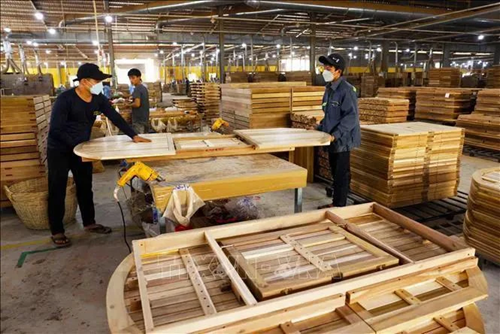Statistics from the General Department of Vietnam Customs showed that Vietnam's wood export turnover in the first 11 months of 2024 was estimated at over 14.6 billion USD. Industry experts said seeing the market’s robust recovery signs, enterprises have proactively outlined production plans and sought new markets.
    |
 |
|
Vietnam eyes to ship 15.2 billion USD worth of wood products abroad this year. |
According to Vice Chairman of the Handicraft and Wood Industry Association of Ho Chi Minh City Nguyen Chanh Phuong, the U.S. now accounts for 54% of the Vietnamese wood exports. However, it presents ongoing challenges with import taxation policies that keep businesses on their toes.
Firms in key wood producing localities like Binh Duong, Dong Nai, and Binh Dinh have been active in seeking market opportunities.
Chairman of the Binh Duong Furniture Association Nguyen Liem highlighted the efforts of local firms to bolster shipments, including making innovative product designs that are attracting international customers and pivoting to e-commerce channels, demonstrating flexibility in their sales strategies.
Meanwhile, enterprises in Dong Nai province have sold their products to 50 countries and territories, with major markets being the U.S., the E.U., Japan, the Republic of Korea, and China. Since the outset of the year, the locality’s wood export value has already reached 1.3 billion USD, a year-on-year increase of 14.3%.
Additionally, insiders have advocated for stronger domestic market development. Chairman of AA Corporation Nguyen Quoc Khanh said the domestic interior market, comprising furniture and building materials, is estimated at some 10 billion USD. With a population of 100 million and a growing middle class, the domestic market presents significant untapped potential.
Vice Chairman of the Vietnam Interiors Association Vu Hong Cuong said domestic producers are struggling to establish strong design identities and brands, adding while high-end products have been imported from Europe, mid-range and budget segments lack impressive design styles.
He suggested besides export markets, enterprises should tap into the domestic one and set up a firm foothold here.
In the meantime, Chairman of the Vietnam Timber and Forest Product Association Do Xuan Lap emphasized the need for businesses to better their competitive edge through five pillars of production technology, low-emission manufacturing, management, trade promotion, and internal monitoring standards.
Source: VNA